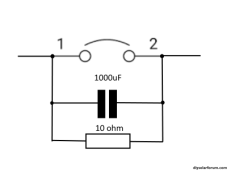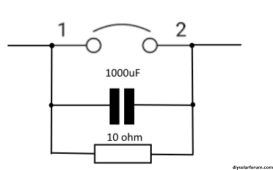I bought this 200A breaker: https://www.aliexpress.com/item/4000506382852.html
Tested a small 48V system with standalone inverter and LiFePo4 48V battery (52.2V) at home. boiled water in 1500W electric kettle, worked no problem.
Went to site and installed 4x 31HDC lead-acid bank with 5.5/11kW AIO. When connected the battery bank, AIO came on for few seconds, then died. Found out AIO only receives 36V from battery bank although at battery terminals it was over 50V. Further investigation revealed voltage is being lost at the breaker. Flipping it on and off did not help.
I drilled off the rivets, opened the breaker and contacts were plasma blackened. Btw. it is nicely done inside, wish I took the pic
This breaker never seen higher current than 15A that one time during initial test and it was flipped on/off maybe 1 dozen times. It was destroyed by DC voltage.
Is there a standard R(L)C circuit that would protect breaker contacts from plasma?
I am thinking a parallel capacitor of 100uF would prevent voltage buildup in first 100us (@ 40A) when the space between contacts is less than required dielectric strength (3kV/mm). 1mF should protect the breaker even after shorts when current is couple hundred amps. Parallel resistor about 10-50ohm will immediatelly after breaking discharge the capacitor so there wont be any charge left when breaker is finally flipped on again. AIO will see some voltage through resistor, but voltage drop on it will be too high so it will gracefully shut down

Tested a small 48V system with standalone inverter and LiFePo4 48V battery (52.2V) at home. boiled water in 1500W electric kettle, worked no problem.
Went to site and installed 4x 31HDC lead-acid bank with 5.5/11kW AIO. When connected the battery bank, AIO came on for few seconds, then died. Found out AIO only receives 36V from battery bank although at battery terminals it was over 50V. Further investigation revealed voltage is being lost at the breaker. Flipping it on and off did not help.
I drilled off the rivets, opened the breaker and contacts were plasma blackened. Btw. it is nicely done inside, wish I took the pic
This breaker never seen higher current than 15A that one time during initial test and it was flipped on/off maybe 1 dozen times. It was destroyed by DC voltage.
Is there a standard R(L)C circuit that would protect breaker contacts from plasma?
I am thinking a parallel capacitor of 100uF would prevent voltage buildup in first 100us (@ 40A) when the space between contacts is less than required dielectric strength (3kV/mm). 1mF should protect the breaker even after shorts when current is couple hundred amps. Parallel resistor about 10-50ohm will immediatelly after breaking discharge the capacitor so there wont be any charge left when breaker is finally flipped on again. AIO will see some voltage through resistor, but voltage drop on it will be too high so it will gracefully shut down

Last edited:



